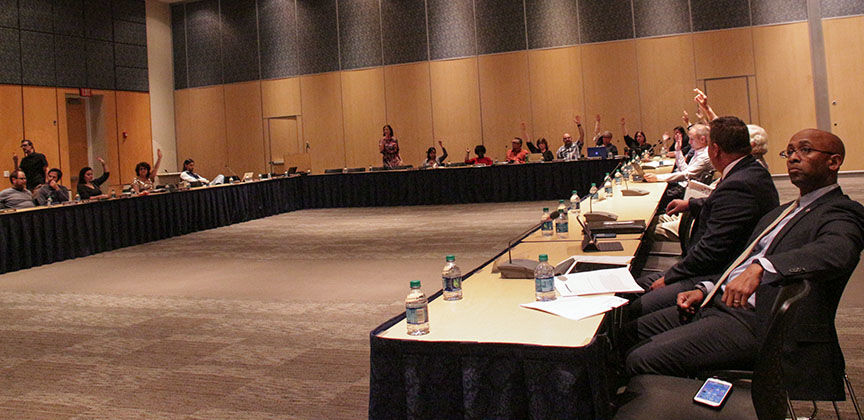Faculty senate rejects new workload policy
April 4, 2019
The Georgia Southern University faculty senate voted down a new faculty workload policy Wednesday which was designed to outline new average workload expectations for the three main areas of a faculty member’s workload.
The workload policy was first introduced in fall 2018, when a committee of faculty from each teaching college drafted a new policy.
The three main functions of university faculty are teaching, scholarship and service.
Teaching is holding lectures and office hours along with grading assignments and responding to students, according to the policy. The general expectation is that this will be 60 percent of a faculty member’s workload.
According to this policy, a semester-long, three-credit course would be nominally equivalent to 10 percent of this section of workload.
Scholarship is the active pursuit of extending knowledge in one’s discipline. This is set to be at minimum 30 percent of one’s workload.
Service is faculty taking part in committee work for departments and service to the institution and the community, which is generally expected to be no less than 10 percent but no more than 30 percent of a faculty member’s workload. Attending meetings is expected of faculty regardless of their workload.
It will be up to department chairs to outline the expectations for their departments in each of these three categories.
Armstrong senator Christy Moore, a senior lecturer for the Department of Diagnostic and Therapeutic Sciences, expressed concern with department heads not being receptive to work with faculty on finding the proper hours.
“We’re overworked, we’re exhausted, we’re ready to quit,” Moore said.
Another issue was a general concern that this policy was not vetted in a way that was satisfactory. Senate Chair Dustin Anderson said this new workload policy was made by an ad hoc committee, which is a committee created and appointed for a specific task, whereas most faculty welfare issues come from and are vetted by the faculty welfare committee.
“The composition of that committee did not include elected members by the faculty, so that caused me some concern,” history professor Michelle Haberland said.
The senate voted against these revisions with 22 votes against and 11 for it, meaning the senate will have to try and reach an agreement at next month’s meeting.
Anderson said if the senate fails to pass a new policy, it will be forced to use the current workload policy next semester.
Kyle Clark, The George-Anne Assistant News Editor, ganewsed@georgiasouthern.edu



